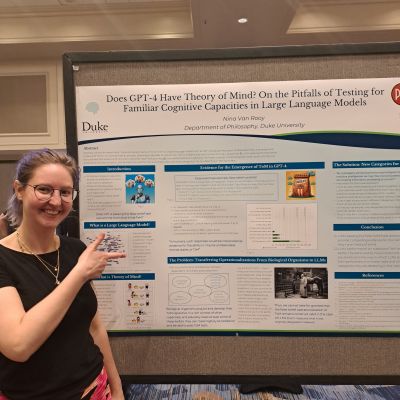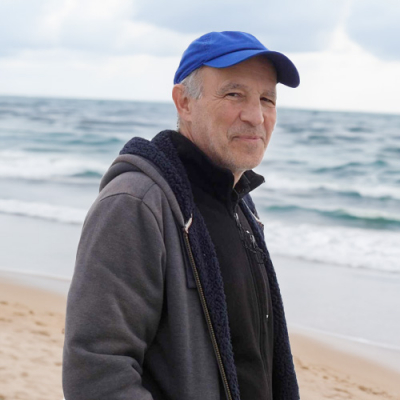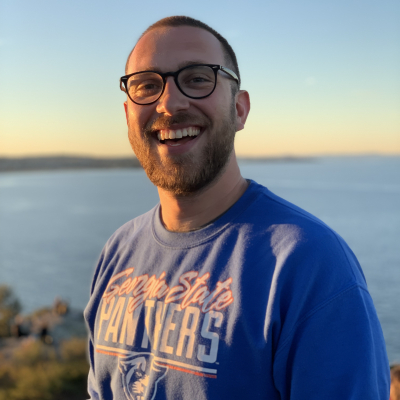The Philosophy Department’s new Business Manager, Amber Murphy, started with us on Monday, November 18th. Amber has administrative experience in several humanities departments elsewhere, most recently as a departmental Business Manager at George Washington University. Her degree is in Public Relations and her experience includes budgeting and financial management (including working with grants), data analysis, and event planning. Please join us in welcoming Amber to Duke and to our department!
Maya Kronfeld is excited to join the Philosophy department as secondary faculty! Maya's research areas of focus include Literature and Philosophy, Aesthetics and Literary Theory, Kant, Hume, English and French Romanticism and Modernism, Jazz and Black Music Studies, African American Literature, Philosophy of Mind, Critical Epistemology, and Cognitive Metaphor Theory.

She was the Cotsen Postdoctoral Fellow in Humanistic Studies in the Princeton Society of Fellows from 2020-2023 after completing her PhD in Comparative Literature at UC Berkeley. Her book project, Spontaneous Form: Consciousness and Philosophical Fiction integrates literary studies with Kantian approaches to the philosophy of mind and jazz studies. Her work appears in The Review of English Studies, Radical Philosophy and Jazz & Culture and is forthcoming in Philosophy and Literature, as well as The Cambridge Companion to Philosophy and Literature, the Cambridge Guide to Kant and Literary Studies and The Johns Hopkins Guide to Critical and Cultural Theory.
She is also a professional pianist who has collaborated with Georgia Anne Muldrow, Toshi Reagon, Nona Hendryx, Thana Alexa and Antonio Sanchez, Christian McBride, and Taylor Eigsti, and lent her skills to drummer-led projects by Justin Brown, Blaque Dynamite, Nikki Glaspie and Thomas Pridgen. She is piano faculty at the Stanford Jazz Workshop, and performed most recently at the Newport and Monterey Jazz Festivals.

Nina Van Rooy presented a poster at the PSA in New Orleans. She is also taking part in a winter school on the neuroscience of consciousness in Cancun, Mexico, from 18-22 December! (Poor Nina.)

Katherine Brading met up with our former PhD student, Qiu Lin, in Boston. Katherine says, "We gathered following the death of our friend and mentor, George Smith. We shared memories and stories and raised a glass. Though the occasion was sad, I am happy to report that Qiu is loving her job at Simon Fraser and her life in Canada. We hope to tempt her back for a visit soon."

More from Katherine: "I was in Pittsburgh at the start of November, to give a joint Philosophy and HPS department colloquium, and to meet with Mark Wilson and Porter Williams' seminar in which they are reading Marius's and my book (Philosophical Mechanics in the Age of Reason). While I was there, I caught up with our former grad student Tzvetan Moev, who seems to be thriving; answered a gazillion inquiries into the well-being of the much beloved former Pittsburgh-ites Jennifer Jhun and Jennifer Whyte; and met a first-year PhD student (Afra Akram) who is a former undergrad student of a former PhD student of mine. Small world."

Dan McShea has an article in Aeon presenting for a general audience his work (with our own Gunnar Babcock) on purpose, goal directedness, and what they call "field theory."


Sally Huang is thrilled to announce her very first publication! Her paper, 'To Love Surprise Like a Butterfly: A Zhuangzian Life of Playing,' is forthcoming in Dao: A Journal of Comparative Philosophy. Pictured above is Sally, dreaming she is a human philosopher.
Jennifer Whyte, that silver-tongued luminary of linguistic zingers, has published a new paper in International Studies in the Philosophy of Science: "Mathematical SETIbacks: Open Texture in Mathematics as a New Challenge for Messaging Extra-Terrestrial Intelligence." The abstract is below:

Beyond the obvious technical difficulties, human attempts to communicate with hypothetical Extra-Terrestrial Intelligences also present a number of philosophical puzzles. After all, an alien intelligence is likely the closest thing to a Wittgensteinian lion humanity could ever encounter. In this paper I advance a new challenge for the feasibility of communication with extra-terrestrials. The problem I raise is a practical problem that falls out of the history and philosophy of mathematics and the implementation of METI projects—specifically, the semiprime self-decryption schema of the Drake Pictures message strategy. The Drake Pictures strategy presumes that aliens share the concept ‘prime number’ with us, as understanding that concept is necessary to decrypt our message. However, if the concept ‘prime number’ exhibited open texture at any point in its history, it could have developed in a different direction than it did in our history. If that is so, an alien could have the concept ‘prime number’ and still not be capable of decrypting our messages. I argue that this new problem is more trenchant than previous arguments in both the philosophy and SETI literature, such as applications of the aforementioned Lion argument and other concerns about the possibility of long-range communication without the assumption of shared concepts.

Two Duke Philosophers -- Kevin Hoover and Jennifer Jhun (in collaboration with Marcel Boumans from the University of Utrecht) -- will lead this year's Vienna Summer School, titled "The History and Epistemology of Econometrics."

The summer school will take place over a two-week session, July 7-11, 2025, and will consist of a program of lectures, seminars, and tutorials directed to graduate students. This is an outstanding opportunity not only to broaden one's understanding of the relationship between the culture of science, its philosophy and scientific practice, but also to establish connections with international colleagues. Duke students who attended the program in previous years were enthusiastic and felt the program contributed significantly to their graduate career.

Students in all disciplines are welcome to apply. As part of their exchange program, Duke and Vienna Summer School will provide fellowships to successful applicants, covering full tuition. Apply directly to Vienna https://summerschool-ivc.univie.ac.at/application/ but send the Duke coordinator, Malachi Hacohen, a brief note indicating that you have submitted your application (mhacohen@duke.edu). Vienna determines admission and will be contacting successful applicants. Deadline is February 15, 2025.

Caleb Hazelwood is second author on a paper recently published in Royal Society Open Science. The paper does exactly what it says on the tin: "Animal emotions and consciousness: a preliminary assessment of researchers’ perceptions and biases and prospects for future progress." His collaborators on this project are a team of animal psychologists and ethologists: Matthew Zipple (Cornell, and a Duke alum!), Marcela Benítez (Emory), and Mackenzie Webster (Emory). The paper has recently gotten some press at Emory -- check out this interview with Benítez to learn more!

Rachel asks: “What is the most important historical site we should all see before we die?” I must admit I’m a little stumped by this one—I do know the one to visit after (the White House), and the most important one to hear (Easter Island?)… We might even revise that old dispute—“Does he who travels know more, or does he who reads?”—and ask if it is the one who sees or the one who hears, for reading is a form of hearing when you think about it. Alas, you cannot see or hear history, and as Marcus Aurelius put it, “He who would have it otherwise, may as reasonably expect figs should be without juice.” (Meditations Book IV, 6)
But there is apparently this unpresciently low railroad overpass in downtown Durham they call “the Can Opener” for what it does to unsuspecting trucks passing under it, which sounds like something to see and hear.
(Edit: And turns out you can do that from the comfort of your very home, since there is a whole website dedicated to it. Be warned, this thing is hungrier than a toddler opening presents on Christmas morning after a year without sugar.)
If you have a question for Tayfun for the next newsletter, please send it to tayfun.gur@duke.edu... though you may get some advice even if you don't.
(Editor's note: I paid $20 for this Halloween costume, and I intend to get my money's worth.)